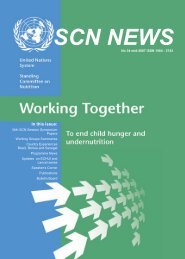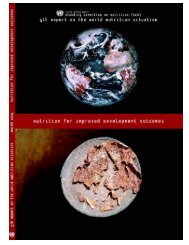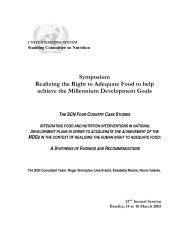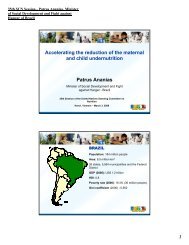Universal Salt Iodization (USI) - FTP Directory Listing
Universal Salt Iodization (USI) - FTP Directory Listing
Universal Salt Iodization (USI) - FTP Directory Listing
- No tags were found...
Create successful ePaper yourself
Turn your PDF publications into a flip-book with our unique Google optimized e-Paper software.
76PUBLICATIONSwww.unsystem.org/scnProtein and amino acid requirement in human nutrition:Report of a Joint WHO/FAO/UNU Expert consultationWHO/FAO/UNU (online)This report arises from the Joint WHO/FAO/UNU Expert Consultation on Proteinand Amino Acid Requirements in HumanNutrition, held at WHO headquarters from9 to 16 April 2002. It builds on the work ofseveral earlier consultations and meetings.Since last expert consultation in1981 scientific knowledge and field experiencehave now moved far enough forward that a review ofthe expert opinion is warranted. This report is not an end-point,but an important step in the continuous quest for scientificallybasedanswers, and for understanding the implications of theseanswers in terms of improved nutrition and health.www.who.int www.fao.org www.unu.eduSelected indicators of food and agricultural developmentin the Asia-Pacific region 1996-2006FAO (online)This comprehensive and detailed compilationof statistics on farming, livestock,fishery, forestry and nutrition in Asia-Pacific countries for the decade 1996-2006. The publication uses mostly FAOstatistics based on information providedby member countries. Included is a tablereporting on the status of organic farmingin the region and a section on countryprofiles. It provides a handy comparison of changes over thepast decade in the use of agricultural land and farm inputs, productionof farm and horticulture crops, livestock, fisheries, forestryand agricultural trade in countries of the Asia-Pacific region,where over 53 percent of the total population were engaged infarming and related activities. www.fao.orgWater, sanitation and hygiene: Quantifying the healthimpact at national and local levels in countries withincomplete water supply and sanitation coverageFewtrell L, Prüss-Üstün A, Bos R,Gore F, Bartram J - WHO (online)This guide aims to assist in the developmentof a quantitative estimate of healthimpacts attributable to water, sanitationand hygiene (WSH) related risks atcountry or local level. Most of data availablefor the methods used cover developingcountries, and this guide is thereforemainly relevant to developing countries.Eleven diseases or injuries are reviewed. The disease burdenfrom malnutrition is linked to WSH risks because of repeateddiarrhoea and intestinal nematode infections especiallyaffecting children. Several infectious diseases such as intestinalnematode infections, schistosomiasis, trachoma or dengue incertain regions are almost entirely attributable to WSH-relatedrisks. The fraction of the other diseases attributable to WSHshould be estimated based on the basis of expert judgementand, where possible, a systematic review of the literature. Methodsfor pooling of expert judgement and for systematic literaturereviews are outlined in this guide.www.who.intSCN NEWS # 35 back to contentsState of the World's mothers 2007:Saving the Lives of Children Under 5Save the Children (online)This document focus on the 28,000 childrenunder age 5 who die every day from easilypreventable or treatable causes and thetragic fact that basic, lifesaving remediesstill are not reaching millions of mothersand children in need. This report helps tobring attention to low-cost solutions thathave the greatest potential to save lives. Italso identifies countries that are succeedingin tackling this problem, showing that effective solutions to thischallenge are affordable – even in the world’s poorest countries.www.savethechildren.orgCash and Food Transfer: A PrimerWFP (online, E/F/S)The objective of this paper is to unpack thevarious aspects of the “cash versus food”debate, to map out where the controversieslie and to demonstrate the need for a morepragmatic, balanced and context specificapproach. A key message is that appropriatenesscannot be predetermined sinceprogramme objectives, the economics offood consumption, market analysis, costs effectiveness and efficiency,capacity requirements and beneficiary preferences allplay a role in determining the most appropriate option or combinationsof options. www.wfp.orgFAO1. Ending Poverty, Hunger and Malnutrition in Africa: incorporatingfood security, nutrition and livelihood objectivesinto common development assistance frameworks.A review of the external policy environment2. Incorporating Food Security, Nutrition and LivelihoodObjectives into Community Action Processes (CAP) -Frameworks for Building Organizational Capacities3. Incorporating Food Security, Nutrition and LivelihoodObjectives into Community Action Processes (CAP) -Evaluating Organizational Capacities4. Passport to Improving Nutrition in Social Protectionand Agricultural Development InitiativesThe analysis of the external policy environment (1) points to thecritical need for technical support to help build the capacity ofregional and national situations for designing, delivering andmanaging more effective programmes.A framework is proposed (2) for developing the organizationalcapacity required to incorporate food security, nutrition and livelihoodsobjectives and considerations into development planning;a 6-step approach is described for evaluating organizationalcapacities (3) and lastly a passport is available (4) that provideskey questions to be asked when collecting information to helpguide the design of interventions and forms part of the FAOguidelines for Incorporating Food Security, Nutrition and LivelihoodObjectives into Community Action Processes. These 3papers provide useful tools and ideas to work with governmentsand other national stakeholders to develop enabling policies fornutritional improvement as well as for emergency preparednessplans and activities. Contact: Brian.Thompson@fao.org







